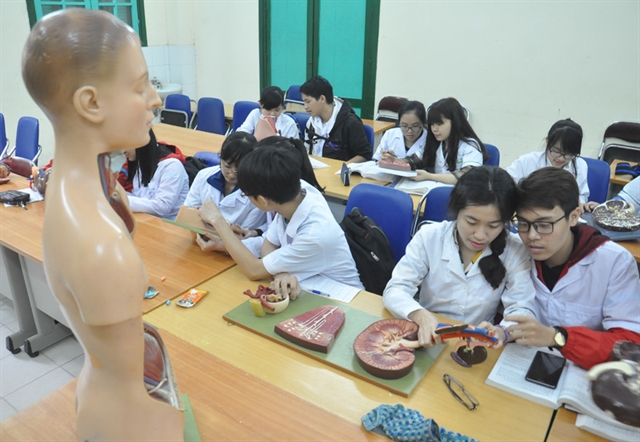 Society
Society


|
| Students at the Hà Nội Medical Universirt. — Photo vietnamnet.vn |
HÀ NỘI — Việt Nam’s universities of sciences and technology place an engineering degree above that of a bachelor of technology degree, citing the rising demand in labour market and quality of graduates as the reasons.
Despite some overlapping curriculum content, an engineering degree takes five years while the technology bachelor one can be completed in four years or less.
Longer courses means more credits, and increases the chances of students gaining employment after finishing their degrees.
Trần Văn Tớp, deputy director of Hà Nội University of Science and Technology (HUST) – the country’s most prestigious institute for engineering education, told Thanh niên (Young People) newspaper that the university started offering four-year programs for technology bachelor degrees from the 2011-12 school year besides its renowned five-year engineering programs.
However, these new courses have gotten low enrolment with many graduates of the four-year programs wanting to study for one more year to gain engineering degrees.
“The amended Law on Higher Education allows universities to develop integrated programs,” said Tớp.
“Students who receive enough necessary credits can obtain bachelor degrees, those students who finish the 5.5-year program, equivalent to some 175 credits, will be awarded engineering degrees.”
“From the 2019-20 school year, we can merge two programs, allowing students to further study after completing the bachelor program,” he said.
“As employers prefer candidates who have engineering degrees, the demand remains high.”
Phạm Xuân Anh, deputy director of Hà Nội-based University of Civil Engineering, said enterprises were not interested in technical graduates as they still lacked the knowledge to start working immediately after finishing four-year programs.
Professor Phan Thanh Sơn Nam of HCM City University of Technology, said in the field of technology and sciences education, an undergraduate program with less than 140 credits is a disaster.
“An undergraduate program for chemical technicians at American universities takes four years earning about 130 credits,” he said.
“With the same program, Vietnamese students will need to complete some 149 credits while facilities at our universities are obviously not as good as in the US. Therefore, it will be a disaster for undergraduates of technology or sciences to obtain bachelor degrees with less than 140 credits.”
According to Tớp, HUST requires at least 161 credits for each engineering training program. He stressed upon the difference between volume of learning and appropriate time to complete the volume.
He said there were some students who can earn 40 credits per year and spend only four years to finish 160 credits. However, they have to be excellent and extremely determined.
“We allow students to increase credits taken in a year to reduce time if they are capable. Not every student can do so,” he said.
“I do not recommend shortening training time at universities. Five years is necessary for any engineering training program.”
Last year marked two decades of the Excellent Engineering Training Program (PFIEV) in Việt Nam in which syllabuses are co-developed between French-renowned engineering schools and Vietnamese counterparts.
PFIEV is now implemented in four universities including HUST, HCM City University of Technology, University of Civil Engineering and Đà Nẵng University of Technology, enrolled by some 6,300 students.
From 2014 to 2019, nearly 4,000 engineers graduated from these programs including 300 students taking duo-diplomas and having graduate internships at French partner universities.
French Republic recognised engineering diplomas awarded by PFIEV programs three times in three periods, from 2004 to 2010, 2010 to 2016 and 2016 to 2020.
Since 2016, Việt Nam’s Ministry of Education and Training have recognised PFIEV graduates equivalent to a Master’s degree. They only need to complete 6-month theses to hold a Master’s degree in Science. — VNS




